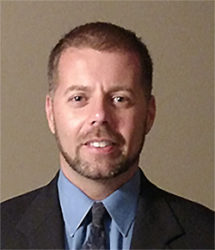Q&A with an NSC Rising Star of Safety, Class of 2015

The NSC Rising Stars of Safety program recognizes leaders of tomorrow for their commitment to safety, influence on safety culture, promotion of continuous workplace safety improvement and creation of safety initiatives producing measureable outcomes. Below, meet a Rising Star from the Class of 2015.
John Campbell
Health and Safety Professional
Oak Ridge National Laboratory
Oak Ridge, TN
What are you looking forward to at Congress?
I am looking forward to meeting my 2015 “40 under 40” cohorts. Fortunately, this is my first year of being in the Young Professionals Division, so I am excited about becoming a mentor in that group.
Why did you choose a career in safety?
It would be safe to say that safety chose me rather than choosing a career in safety. I am an engineer by trade but was fortunate enough to have my first professional position out of school with Tennessee OSHA and learn the world of safety. I learned of the large following that safety has in the United States and the world, that collaboration was welcomed and that workers respect you if you are looking out for their health in general.
What is the greatest challenge you have faced in ensuring workplace safety, and how have you overcome it?
There is no doubt in my mind that the greatest challenge is the “old school” workers. I learned early in my career that most of them think safety is overrated and a waste of money. It took me many years to learn how to talk, influence and show them the value of safety. This is definitely an art, and most of the time you have to paint a different picture depending on their personality. The best advice I would give a cohort struggling with this issue is to win small battles often –that’s how you start turning them around.
What is the most valuable lesson you have learned so far in your career as a safety professional?
I have learned that the United States is always going to be progressing in the subject of safety. Just think how many new safety devices and procedures we have in businesses, airports, schools, etc., than we did 10 years ago. The value of this tells me the environment around us is getting more safe, but it also tells me that my position as a safety professional is becoming more important and needed each and every day! That is a great outlook to the future for job security.
What safety success are you most proud of achieving at your current employer?
At Oak Ridge National Laboratory, we do a broad scale of high-end research. In order to do that research, there has to be electricity to power the labs, steam to provide heat, chilled water to provide machinery cooling, etc. The Utilities Division has a tremendous impact on the entire campus, especially if a specific utility is not working properly. The work the Utilities Division does is extremely diverse and complicated at times. I was able to make an enhancement to the current job hazard analysis system by providing a detailed, step-by-step job hazard analysis for moderate- to high-hazard work. This information provided supervisors with enhanced detailed information, which they could use to have a more efficient and high-impact pre-job briefing.
What piece of advice do you have for other up-and-coming safety professionals?
Here are my four keys to being successful that I would tell an up-and-coming safety professional, in order of priority:
- Find a great mentor: When you are interviewing for a position, you should also be interviewing the company/your supervisor. This is the person who will be teaching you everything. It NEEDS to be the right person/mentor.
- To me, the ideal hire for any safety professional position is someone who has a broad background and has a top-tier strength in one H&S subject. In my opinion, experience will take you further than education – but education is very important!
- Earn your scars and get them from different places! Unless you are in an ideal situation with your first job as a safety professional, take jobs in different industries. Don’t get stuck in a particular industry for all of your career. You’ll be amazed at how different industries/organizations deal with identical S&H issues.
- You are going to make mistakes; I made some incredible ones! Just make sure you learn what you are supposed to learn and do your best not to make them again.

